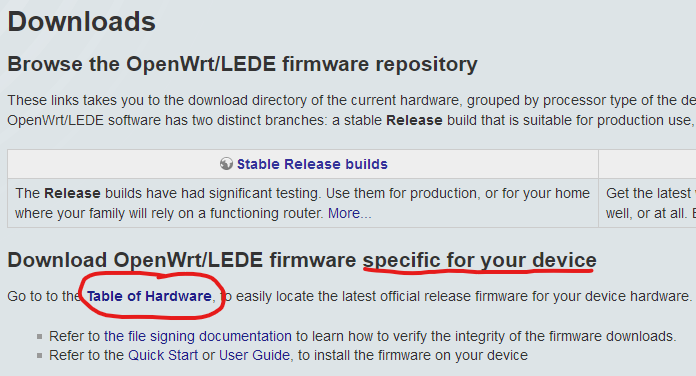So I've recently built a computer and I've noticed that the download speeds were particularly slow(300 kbps when we pay for 3 mbps). So I posted something on Reddit which lead me to wanting to download openWRT so I could get cake sqm. When I go to download OpenWRT and click on my router to see the download options I'm overwhelmed by the 100's of different options am I supposed to download all of them? Am I supposed to download just one? Which one am I supposed to download? Am I even on the right website? All help is appreciated.
Also this is the link to show you what I was talking about when I said 100's of different options:
https://openwrt.org/releases/19.07/changelog-19.07.0
SQM can help you distribute the connections (from multiple concurrent applications or multiple hosts in your LAN) more fairly and to reduce buffering, but it can't magically make your WAN connection faster (on the contrary, it needs to cap the maximum throughput to function).
None, the TP-LINK Archer C50 v2.x is not supported yet (although the hardware would be better than the already supported hardware revisions for v1, v3 or v4). Considering the listed hardware specifications, it shouldn't be too difficult to add support for it, but it still needs to be done by someone experienced (this someone might be you, but it's not a walk in the park either), with the device on their desk.
With only 300 kBit/s, not really - you'd rather want to talk to your ISP's support instead, to get them fix/ improve the connection speed. That doesn't mean OpenWrt wouldn't work well with such a connection, but it can't really improve it either.
SQM can make a contended WAN connection feel more agile and snappy, which can be helpful (or even outright necessary --> VoIP/ SIP, live TV streaming, gaming, etc.) for fast or slower internet connections, but it needs a little sacrificial bandwidth to do its magic - and it can't make your connection any faster. For very slow connections (such as yours) or connections with variable connection speeds (somehow I expect that to apply to your connection as well), you don't really have that luxury - for those, dealing with some delays tends to be better than sacrificing any of your precious bandwidth.
